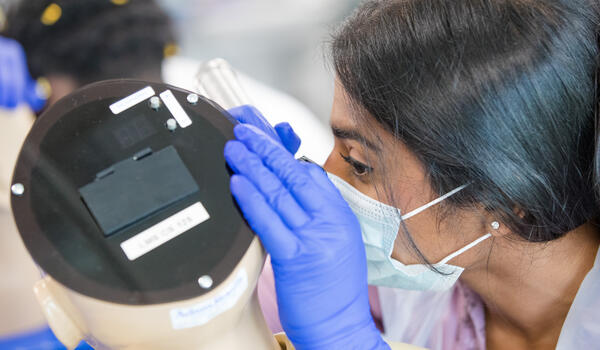Tab Content: A-levels
GCSE:
In eight subjects attained by the end of Year 11.
At least a score of 13 points from the eight where A*-A or 7-9 = 2 points; B or 6 = 1 point1, 2
A minimum of a grade B or 6 in the following required subjects:
- Biology, Chemistry and Physics taken as individual subjects (or Combined Science: Trilogy as two GCSE qualifications)
- English Language and
- Mathematics
All subjects are expected to be at least grade C or 4.
A-level:
Three subjects taken at one sitting after two years of study3, including any two of Biology, Chemistry or Psychology4. Grade requirements: AAA
Three subjects taken at one sitting after two years of study3, including any two of Biology, Chemistry or Psychology4 plus a 4th subject or EPQ5. Grade requirements: AAB (b)
Only one of Maths or Further Maths will be considered and native languages can only be considered as a 4th subject.
BTEC (Level 3 Extended Certificate) may be considered in lieu of 3rd A-level subject. BTEC (Certificate) may be considered in lieu of 4th AS-level subject. Please note, BTEC Applied or Medical Science is not accepted, as a 3rd or 4th subject.
Additional Information:
- BTEC Level 2: Dist/Dist*= 2 points; Merit (or equivalent) = 1 point. BTEC qualifications are not acceptable replacements for English, Maths and Science subjects.
- Two points is the maximum score awarded in each subject area: for example, only one of Maths and Further Maths considered; Dual Award GCSEs (with the exception of Dual Award Science) are awarded a maximum of 2 points. Short courses will be awarded, at most, half the points of a full GCSE.
- Lancaster Medical School will consider applications from applicants who have taken longer than two years to achieve the required grades at A Level, if the applicant otherwise meets the GCSE criteria and the non-academic entry requirements. Please see our resit policy below.
- If Biology or Chemistry is not studied at A Level, then GCSE must be at least grade A/7
- Qualifications considered as 4th subjects include any A Level or AS subject, BTEC (Certificate), Cambridge Pre-U Short Course, which do not duplicate content covered in the applicant's three A Levels, as well as EPQ, Core Maths or Welsh Baccalaureate.
English Language Requirements:
English Language Requirements for Medicine
If you are applying from outside the UK or if you have been permanently domiciled in the UK for less than 5 years and have not continuously resided in a majority English Language speaking country (as listed on the gov.uk website), you must demonstrate proficiency in English through one of the following recognised English Language qualifications:
- IELTS (a minimum score of 7.0 with no component less than 7.0) or
- Pearson PTE Academic qualification (at least 70 overall and at least 70 in each communicative skill sub-test).
This is in addition to the academic entry requirements outlined above. We do not accept other English Language proficiency qualifications. Applicants must demonstrate their English language proficiency before application. Applicants who do not include details of their English language proficiency qualification on their UCAS application will not be considered. English language qualifications must be less than 2 years old at the time of application.
Scholarships and Bursaries:
There are a range of scholarships available to both home and overseas students. Visit our Scholarships and Bursaries webpage to find out if you are eligible to receive any of them.
Tab Content: International Baccalaureate
GCSE:
In eight subjects attained by the end of Year 11.
At least a score of 13 points from the eight where A*-A or 7-9 = 2 points; B or 6 = 1 point1, 2
A minimum of a grade B or 6 in the following required subjects:
- Biology, Chemistry and Physics taken as individual subjects (or Combined Science: Trilogy as two GCSE qualifications)
- English Language and
- Mathematics
All other subjects must be at least grade C or 4.
International Baccalaureate:
36 points overall, achieved after two years of study3, to include:
At Higher Level (HL): any two of Biology, Chemistry or Psychology4 and one other subject; all at a minimum of 6 points.
At Standard Level (SL): three subjects, all at a minimum of 5 points.
Additional Information:
1. BTEC Level 2: Dist/Dist*= 2 points; Merit (or equivalent) = 1 point. BTEC qualifications are not acceptable replacements for English, Maths and Science subjects.
2. Two points is the maximum score awarded in each subject area: for example, only one of Maths and Further Maths considered; Dual Award GCSEs (with the exception of Dual Award Science) are awarded a maximum of 2 points. Short courses will be awarded, at most, half the points of a full GCSE.
3. We will consider applications from applicants who have taken longer than 2 years to achieve the required grades in the International Baccalaureate. Please see our resit policy below.
4. If Biology or Chemistry is not studied at Higher Level in your IB, then GCSE must be at least grade A/7
English Language Requirements:
English Language Requirements for Medicine
If you are applying from outside the UK or if you have been permanently domiciled in the UK for less than 5 years and have not continuously resided in a majority English Language speaking country (as listed on the gov.uk website), you must demonstrate proficiency in English through one of the following recognised English Language qualifications:
- IELTS (a minimum score of 7.0 with no component less than 7.0) or
- Pearson PTE Academic qualification (at least 70 overall and at least 70 in each communicative skill sub-test).
This is in addition to the academic entry requirements outlined above. We do not accept other English Language proficiency qualifications. Applicants must demonstrate their English language proficiency before application. Applicants who do not include details of their English language proficiency qualification on their UCAS application will not be considered. English language qualifications must be less than 2 years old at the time of application.
Scholarships and Bursaries:
There are a range of scholarships available to both home and overseas students. Visit our Scholarships and Bursaries webpage to find out if you are eligible to receive any of them.
Tab Content: Graduate
GCSE:
In eight subjects attained by the end of Year 11.
At least a score of 13 points from the eight where A*-A or 7-9 = 2 points; B or 6 = 1 point1, 2
A minimum of a grade B or 6 in the following required subjects:
- Biology, Chemistry and Physics taken as individual subjects (or Combined Science: Trilogy as two GCSE qualifications)
- English Language and
- Mathematics
All other subjects must be at least grade C or 4.
A-level:
Three subjects taken at one sitting, after 2 years of study.
Where degree is in a Biological, Biomedical or Health Science Subject: BBB including any two of Biology, Chemistry or Psychology3,4
Where degree is in any other subject: AAB including any two of Biology, Chemistry or Psychology3,4.
General Studies, Critical Thinking and native languages are only considered as the 4th subject. Only one of Maths or Further Maths will be considered.
Higher Education:
A minimum of an Upper Second Class honours degree with an average transcript mark of 65% or higher predicted/already attained.
Additional Information:
1. BTEC Level 2: Dist/Dist*= 2 points; Merit (or equivalent) = 1 point. BTEC qualifications are not acceptable replacements for English, Maths and Science subjects.
2. Two points is the maximum score awarded in each subject area: for example, only one of Maths and Further Maths considered; Dual Award GCSEs (with the exception of Dual Award Science) are awarded a maximum of 2 points. Short courses will be awarded, at most, half the points of a full GCSE.
3. If Biology or Chemistry is not studied at A Level, then GCSE must be at least grade A/7
4. If Biology, Chemistry or Psychology A Level(s) are taken at a later date, the original A Levels must be at least BBB
English Language Requirements:
If you are applying from outside the UK or if you have been permanently domiciled in the UK for less than 5 years and have not continuously resided in a majority English Language speaking country (as listed on the gov.uk website), you must demonstrate proficiency in English through one of the following recognised English Language qualifications:
- IELTS (a minimum score of 7.0 with no component less than 7.0) or
- Pearson PTE Academic qualification (at least 70 overall and at least 70 in each communicative skill sub-test).
This is in addition to the academic entry requirements outlined above. We do not accept other English Language proficiency qualifications. Applicants must demonstrate their English language proficiency before application. Applicants who do not include details of their English language proficiency qualification on their UCAS application will not be considered. English language qualifications must be less than 2 years old at the time of application.
Scholarships and Bursaries:
There are a range of scholarships available to both home and overseas students. Visit our Scholarships and Bursaries webpage to find out if you are eligible to receive any of them.
Tab Content: Scottish Highers
National 5:
At least seven1 subjects attained by the end of S4 including Biology, Chemistry, Physics, English Language, Mathematics2, plus at least two other subjects.
Required grades: National 5 (A or B) or Standard Grade Credit (1 or 2) or Intermediate 2 (A or B)
Highers:
At least five subjects taken at one sitting, after one year of study3 including Biology (A), Chemistry (A), plus at least three other subjects.
Minimum grades required: AAAAB
Advanced Highers:
Biology and Chemistry, taken at one sitting, after one year of study3. Minimum grades required: AA.
Additional Information:
1. Applicants who have taken less than seven subjects at National 5 may be considered if the academic reference states that it is school or local authority policy for National 5 students to be entered for fewer than seven examinations.
2. All applicants must study Biology, Chemistry, Physics, English Language and Mathematics to National 5/Standard grade. Applicants may be able to take an additional National 5 subject alongside their Highers or Advanced Highers to meet this subject requirement.
3. We will consider applications from applicants who have taken longer than 2 years to achieve the required grades in their Highers/Advanced Highers subjects. Please see our resit policy below.
English Language Requirements:
English Language Requirements for Medicine
If you are applying from outside the UK or if you have been permanently domiciled in the UK for less than 5 years and have not continuously resided in a majority English Language speaking country (as listed on the gov.uk website), you must demonstrate proficiency in English through one of the following recognised English Language qualifications:
- IELTS (a minimum score of 7.0 with no component less than 7.0) or
- Pearson PTE Academic qualification (at least 70 overall and at least 70 in each communicative skill sub-test).
This is in addition to the academic entry requirements outlined above. We do not accept other English Language proficiency qualifications. Applicants must demonstrate their English language proficiency before application. Applicants who do not include details of their English language proficiency qualification on their UCAS application will not be considered. English language qualifications must be less than 2 years old at the time of application.
Scholarships and Bursaries:
There are a range of scholarships available to both home and overseas students. Visit our Scholarships and Bursaries webpage to find out if you are eligible to receive any of them.
Tab Content: Access
Access to Higher Education qualifications are designed for adults who are returning to education, and who have achieved few previous qualifications because of social, educational or individual circumstances. Access to Higher Education programmes provide academic preparation for higher education study and allow mature applicants to demonstrate their academic suitability for further study.
These qualifications not appropriate for school-leavers to gain entry to our medicine programmes and will not usually be accepted in lieu of resitting A-levels, or other equivalent qualifications. Lancaster Medical School will not consider applications from applicants enrolled on an Access to Higher Education diploma (Medicine) course if they have already re-taken AS or A Level examinations and failed to meet the standard academic entry requirements at the second attempt. Only one Access-type qualification will be accepted and applicants cannot make multiple attempts at completing access-type courses.
We only accept Access to Medicine courses that comply with the QAA national framework and subject descriptors.
GCSE:
A minimum of a grade B or 6 in the following required subjects1
- Biology, Chemistry and Physics taken as individual subjects (or Combined Science: Trilogy as two GCSE qualifications)
- English Language and
- Mathematics
Qualifications should be achieved at one sitting. Depending on individual circumstances, applicants may be required to demonstrate at least a score of 13 points from eight GCSEs where A*-A or 7-9 = 2 points; B or 6 = 1 point2,3
A Levels:
Any AS or A Level qualifications held (irrespective of subject) should usually be at a minimum of grade C at first attempt. Applicants offering an Access-type qualification to compensate for having studied the wrong subjects at A-level are usually expected to offer three A-levels and have achieved at least BBB at the first attempt.
Access Course:
Complete an approved Access to Medicine course and achieve distinction in 45 Level 3 credits. The Level 3 components of the Access course will need to offer at least 15 Level 3 credits in Biology, 15 in Chemistry and 15 credits in another science and maths that cover physical and mathematical concepts as described in the subject descriptor document above. In addition, 9 ungraded credits should be completed in the use and comprehension of numerical data, study skills and professional behaviours.
Additional Information:
1. BTEC qualifications are not acceptable replacements for English, Maths and Science subjects.
2. BTEC Level 2: Dist/Dist*= 2 points; Merit (or equivalent) = 1 point
3. Two points is the maximum score awarded in each subject area: for example, only one of Maths and Further Maths considered; Dual Award GCSEs (with the exception of Dual Award Science) are awarded a maximum of 2 points. Short courses will be awarded, at most, half the points of a full GCSE.
English Language Requirements:
English Language Requirements for Medicine
If you are applying from outside the UK or if you have been permanently domiciled in the UK for less than 5 years and have not continuously resided in a majority English Language speaking country (as listed on the gov.uk website), you must demonstrate proficiency in English through one of the following recognised English Language qualifications:
- IELTS (a minimum score of 7.0 with no component less than 7.0) or
- Pearson PTE Academic qualification (at least 70 overall and at least 70 in each communicative skill sub-test).
This is in addition to the academic entry requirements outlined above. We do not accept other English Language proficiency qualifications. Applicants must demonstrate their English language proficiency before application. Applicants who do not include details of their English language proficiency qualification on their UCAS application will not be considered. English language qualifications must be less than 2 years old at the time of application. The required level (usually distinction or equivalent) in the approved Access to Medicine course. The Level 3 components of the Access course will need to offer at least 15 Level 3 credits in Biology, 15 in Chemistry and 15 in at least one other subject.
Scholarships and Bursaries:
There are a range of scholarships available to both home and overseas students. Visit our Scholarships and Bursaries webpage to find out if you are eligible to receive any of them.






.jpg)

